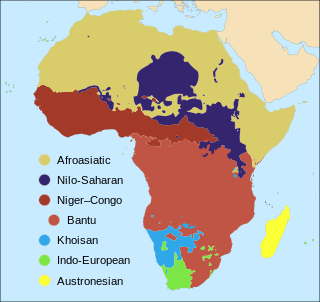Related Research Articles

The languages of Africa are divided into several major language families:
Jalaa, also known as Cèntûm, Centúúm or Cen Tuum, is an extinct language of northeastern Nigeria, of uncertain origins, apparently a language isolate. The Jalabe speak the Bwilim dialect of the Dikaka language. It is possible that some remembered words have been retained for religious ceremonies, but in 1992 only a few elders remember words that their parents had used, and by 2010 there may not even remain any such rememberers.
The Bete language of Nigeria is a nearly extinct language spoken by a small minority of the 3,000 inhabitants of Bete Town, Takum, Taraba State; its speakers have mostly shifted to Jukun Takum. It is close to Lufu.
In phonology, apocope is the loss (elision) of a word-final vowel. In a broader sense, it can refer to the loss of any final sound from a word.
Roger Marsh Blench is a British linguist, ethnomusicologist and development anthropologist. He has an M.A. and a Ph.D. from the University of Cambridge and is based in Cambridge, England. He researches, publishes, and works as a consultant.
Tarok is an agrarian society in the hills and on the plains southeast of Plateau State, Middle Belt, Nigeria.
The Ijawlanguages, also spelt Ịjọ, are the languages spoken by the Ijo people in southern Nigeria. Toke-ere is an ijaw name which means flawless woman, guiltless woman and in some parts translated as neat woman
Lufu may refer to:

Ngas, or Angas, is an Afro-Asiatic language spoken in Plateau State, Nigeria. Dialects are Hill Angas and Plain Angas. Retired General Yakubu Gowon is a prominent Nigerian who is of Ngas extraction.
Bure, also known as Bubbure, is an Afro-Asiatic language belonging to the Bole-Tangale group of the West branch of the Chadic family. It is spoken in northern Nigeria in the village of Bure and in some small settlements nearby. The language is used mostly by a very few speakers, of great-grandparental generation. Except for Hausa, which is lingua franca in the area, Bure is surrounded by other Chadic languages such as Gera, Giiwo and Deno . Compared to other languages of the same group, the endangerment of Bure is by far the most critical.
Longuda (Nʋngʋra) is a Niger–Congo language of Nigeria. Joseph Greenberg counted it as a distinct branch, G10, of his Adamawa family. Boyd (1989) assigned it a branch within Waja–Jen. When Blench (2008) broke up Adamawa, Longuda was made a branch of the Bambukic languages.
The Leko languages are a small group of languages spoken in northern Cameroon and eastern Nigeria. They were labeled "G2" in Joseph Greenberg's Adamawa language-family proposal. The Duru languages are frequently classified with the Leko languages, although their relationship remains to be demonstrated.
The Mumuye–Yendang languages are a proposed group of Savanna languages spoken in eastern Nigeria. They were labeled "G5" in Joseph Greenberg's Adamawa language-family proposal.

The Jukunoid languages are a branch of the Benue-Congo languages spoken by the Jukun and related peoples of Nigeria and Cameroon. They are distributed mostly throughout Taraba State, Nigeria and surrounding regions.
Odual is a poorly studied Central Delta language spoken by the Odual community in the Abua–Odual Local Government Area of Rivers State, Nigeria.
Takum is a Local Government Area in Taraba State, Nigeria. Its headquarters is in the town of Takum, it is created out of Wukari local government in june 1976, at 7°16′00″N9°59′00″E. Takum borders the Republic of Cameroon in the south, Ussa Local Government to the west, Donga Local government to the north, District within Takum are Angwan Dutse, Angwa Abuja, Tikari, Fadama, Gahwetun, Akenten, Acha Nyim, Chanchanji, Sufa, Shimta, Kufi, Muji, Akenten, Jenuwa Gida, Jenuwa Nyifiye, Kwambai Lufu, Kashimbilla Bassang, Likam, Bete, Malumshe, Jidu, Tampwa, Dumse, Nyayirim, Barki Lissa,Acha Sarka, Sabon Gida Yukuben etc.
Wom ([w̃ɔ̃̀m]), or Perema, is a Leko language of Nigeria.

The Akunakuna are an ethnic group of Nigeria and Cameroon, closely related to the Efik, Bahumono and Ibibio people, mostly inhabiting the area around the Cross River. Recent figures have indicated there are over three hundred fifty thousand Akunakuna people.
According to the language family tree classification by Ethnologue, Okpe, Urhobo and Uvwie, alongside Eruwa and Isoko, make up the five Southwestern Edoid languages of the Benue-Congo group. Quoting Johnstone (1993), Ethnologue puts the population of Urhobo people at 546,000, Okpe 25,400 (2000) and Uvwie 19,800 (2000). These three languages have geographically neighbouring languages: Izon and Itsekiri to the west and south, Ukwuani and Isoko to the east and Edo to the north. Thus, Isoko and Urhobo are similar languages that belong to the same linguistic family.
Laka of Lau is the only Central Sudanic language spoken in Nigeria. It is most closely related to Kabba Laka of Chad. The Hausa refer to the Laka people of Lau as Lakawa. The language was only recently documented in the mid-2010s, and had been previously misclassified as a Mbum language along with Lau.
References
- ↑ Lufu at Ethnologue (18th ed., 2015) (subscription required)